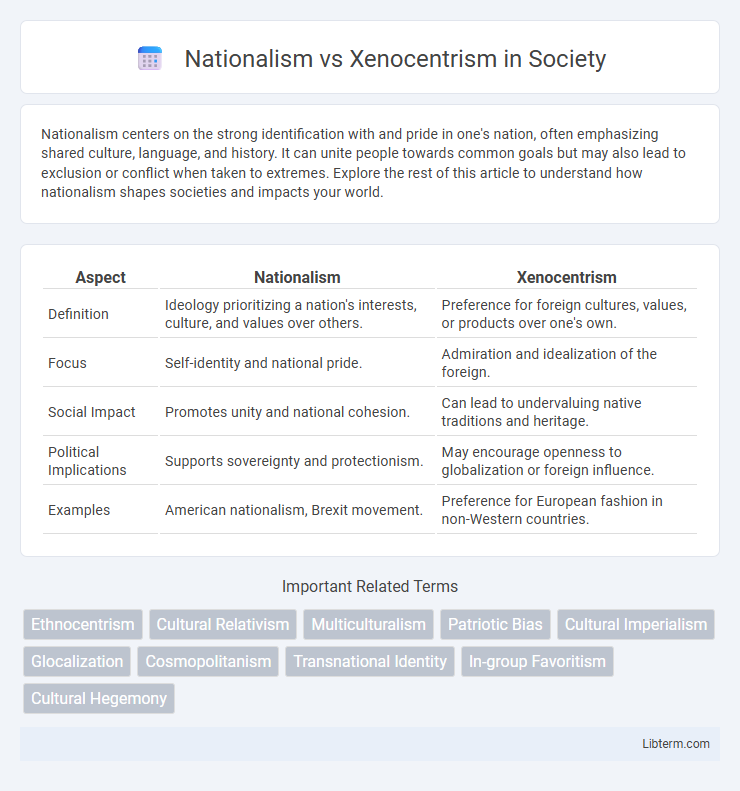Nationalism centers on the strong identification with and pride in one's nation, often emphasizing shared culture, language, and history. It can unite people towards common goals but may also lead to exclusion or conflict when taken to extremes. Explore the rest of this article to understand how nationalism shapes societies and impacts your world.
Table of Comparison
| Aspect | Nationalism | Xenocentrism |
|---|---|---|
| Definition | Ideology prioritizing a nation's interests, culture, and values over others. | Preference for foreign cultures, values, or products over one's own. |
| Focus | Self-identity and national pride. | Admiration and idealization of the foreign. |
| Social Impact | Promotes unity and national cohesion. | Can lead to undervaluing native traditions and heritage. |
| Political Implications | Supports sovereignty and protectionism. | May encourage openness to globalization or foreign influence. |
| Examples | American nationalism, Brexit movement. | Preference for European fashion in non-Western countries. |
Understanding Nationalism: Definition and Origins
Nationalism is a political ideology centered on promoting the interests, culture, and identity of a specific nation, often emphasizing sovereignty and self-governance. Its origins trace back to the late 18th century during the Age of Enlightenment and the French Revolution, where collective identity and popular sovereignty became foundational concepts. Nationalism contrasts with xenocentrism, which involves an affinity for foreign cultures over one's own national identity.
Xenocentrism Explained: Meaning and Historical Context
Xenocentrism is the preference for cultural products, values, or ideas from another country over one's own, often seen as a form of cultural admiration or perceived superiority of foreign cultures. Historically, xenocentrism emerged during periods of colonization, globalization, and cultural exchange when societies adopted foreign customs, technologies, or ideologies, sometimes resulting in a diminished valuation of indigenous cultures. This phenomenon contrasts sharply with nationalism, which emphasizes pride and loyalty to the native culture and heritage.
Key Differences Between Nationalism and Xenocentrism
Nationalism emphasizes pride in and loyalty to one's own nation, promoting cultural, political, and economic superiority or independence. Xenocentrism, conversely, involves a preference for foreign cultures, ideas, or products over those of one's own country, often leading to the belief that other societies are superior. Key differences include nationalism's focus on in-group allegiance and identity preservation versus xenocentrism's admiration for external influences and perceived foreign superiority.
The Psychological Roots of Nationalist and Xenocentric Attitudes
Nationalist attitudes often stem from psychological needs for group identity, security, and social belonging, where in-group favoritism reinforces self-esteem and collective pride. Xenocentrism arises from a cognitive bias favoring foreign cultures, influenced by perceptions of prestige, novelty, and superiority associated with external groups. Both nationalist and xenocentric mindsets are shaped by social identity theory and cognitive dissonance, highlighting how individuals reconcile personal and group identities through contrasting valuations of the familiar and the foreign.
Cultural Identity: Shaping Worldviews Through Nationalism and Xenocentrism
Nationalism emphasizes pride in one's cultural identity, fostering a strong connection to national traditions and heritage that shapes individuals' worldviews through a sense of belonging and loyalty. Xenocentrism, in contrast, values foreign cultures over one's own, influencing perspectives by idealizing external customs and practices, often leading to cultural self-criticism or admiration of other societies. The interplay between nationalism and xenocentrism significantly impacts cultural identity formation, shaping how individuals relate to their own culture versus global influences.
Impact on Society: Nationalism’s Strengths and Weaknesses
Nationalism fosters social cohesion and patriotism by uniting people through shared identity, culture, and values, which can strengthen national solidarity and motivate collective action. However, extreme nationalism risks promoting exclusion, discrimination, and conflict by prioritizing in-group interests while marginalizing outsiders or minority groups. This dual impact influences societal stability, economic cooperation, and international relations, highlighting the need for balanced nationalism that respects diversity while encouraging unity.
Xenocentrism’s Social and Cultural Implications
Xenocentrism promotes the preference for foreign cultures over one's own, leading to diminished national pride and identity erosion in social contexts. This cultural bias can result in the undervaluation of local traditions, languages, and customs, causing generational disconnection and weakened community cohesion. Moreover, xenocentrism fosters social alienation and internalized inferiority, impacting collective self-esteem and national unity.
Nationalism vs Xenocentrism in Globalization
Nationalism emphasizes prioritizing a nation's culture, interests, and identity, often resisting external influences, while xenocentrism idealizes foreign cultures and products, valuing them over domestic ones. In globalization, nationalism can lead to protectionist policies and cultural preservation efforts that counterbalance global integration, whereas xenocentrism may drive increased consumption of global goods and cultural blending. The tension between nationalism and xenocentrism shapes how societies negotiate cultural identity, economic practices, and political sovereignty within interconnected global networks.
Case Studies: Real-World Examples of Both Perspectives
Nationalism manifests through case studies such as the Brexit referendum, where the United Kingdom prioritized national sovereignty and cultural identity over EU integration, highlighting a preference for domestic governance and economic control. Conversely, xenocentrism is illustrated by Japan's fascination with Western culture, technology, and lifestyle despite strong national traditions, showcasing an admiration for foreign attributes perceived as superior. These examples reveal how nationalism emphasizes self-determination and cultural pride, while xenocentrism reflects a preference for adopting external cultural elements.
Balancing Perspectives: Toward Inclusive Cultural Understanding
Nationalism often emphasizes pride in one's own culture and heritage, while xenocentrism idealizes foreign cultures over native traditions, creating tension between cultural affirmation and external admiration. Balancing these perspectives requires fostering inclusive cultural understanding that respects local identity while appreciating global diversity. Promoting intercultural dialogue and education helps bridge gaps, encouraging mutual respect and cohesive societal dynamics.
Nationalism Infographic

 libterm.com
libterm.com